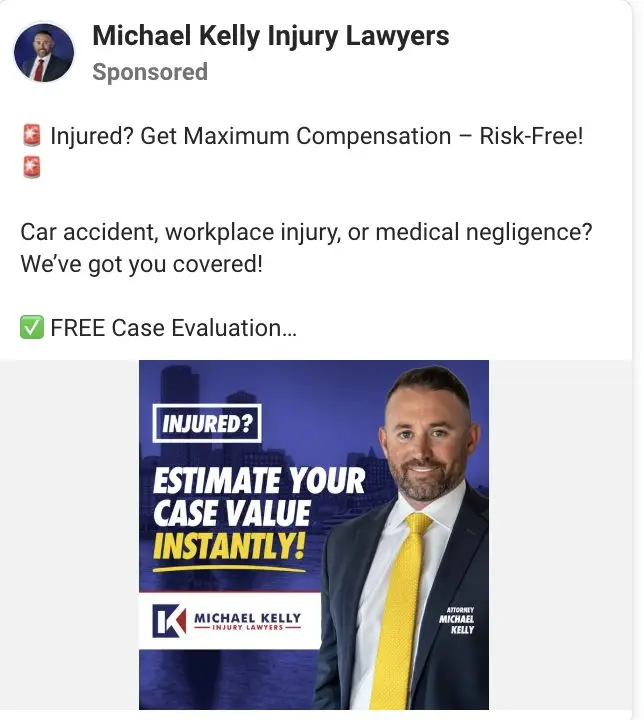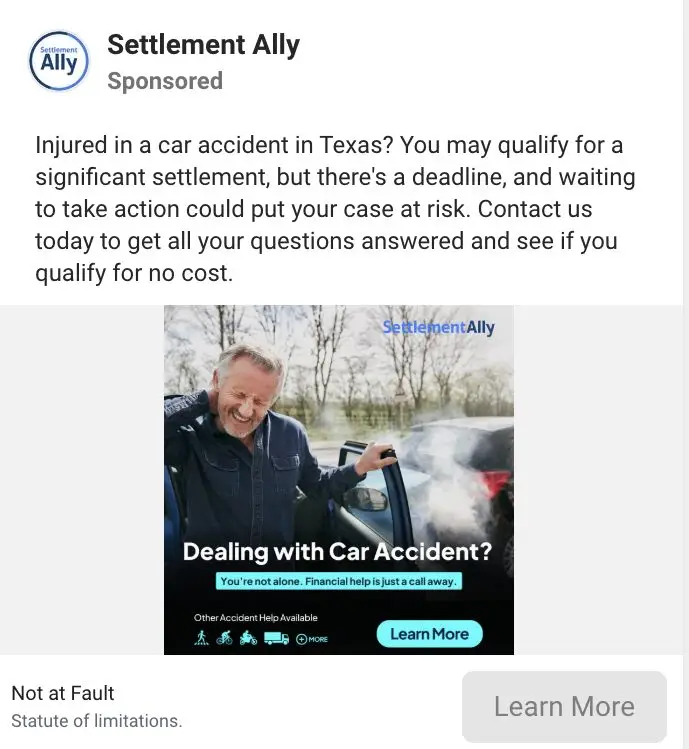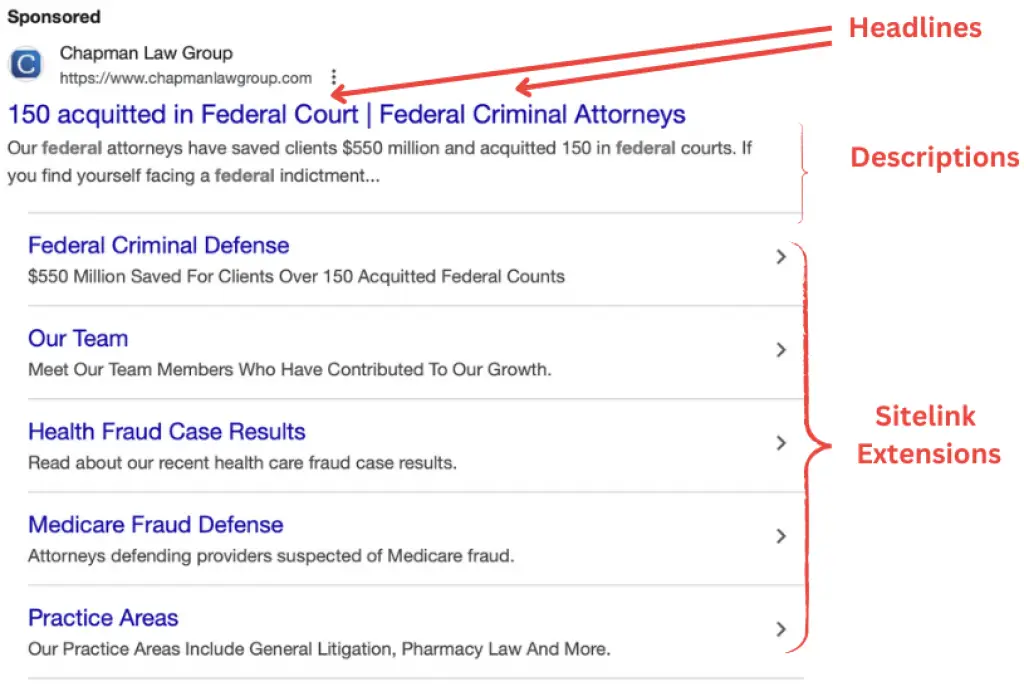
Several aspects make this ad effective:
The headlines are both attention-grabbing and informative, immediately drawing the user in.
A key technique used in the headline is the inclusion of numbers, a proven strategy to boost the number of clics by adding specificity and credibility.
The descriptions are detailed, reinforcing accuracy and reliability by incorporating numerical data again.
Overall, the content is highly relevant and tailored to the search term “Federal Crime Lawyer,” ensuring it aligns with user intent and increases the likelihood of engagement.
Keywords: The Foundation of a Profitable Google Ads Strategy for Lawyers
1) Top 100 High-Intent Keywords for Law Firms
Choosing the right keywords is the single most important factor in making Google Ads profitable for a law firm. Below is a carefully curated list of 100 high-intent keywords that potential clients are actively searching for in the legal field.
| Keyword | Monthly Search Volume (US) |
|---|---|
| lawyer | 301000 |
| attorney | 201000 |
| law firm | 165000 |
| solicitor | 135000 |
| personal injury lawyer | 55000 |
| car accident lawyer | 53000 |
| immigration lawyer | 34000 |
| truck accident lawyer | 29000 |
| divorce lawyer | 27000 |
| personal injury lawyer near me | 25000 |
| accident lawyer | 24000 |
| injury lawyer | 23000 |
| motorcycle accident lawyer | 20000 |
| wrongful death lawyer | 19000 |
| medical malpractice lawyer | 17000 |
| criminal defense lawyer | 17000 |
| DUI lawyer | 16000 |
| car accident lawyer near me | 15000 |
| dog bite lawyer | 14000 |
| slip and fall lawyer | 14000 |
| best personal injury lawyer | 14000 |
| auto accident lawyer | 14000 |
| divorce lawyer near me | 14000 |
| criminal lawyer | 13000 |
| family law attorney | 12000 |
| criminal defense attorney | 11000 |
| bankruptcy attorney | 10200 |
| estate planning attorney | 9900 |
| employment lawyer | 9500 |
| business lawyer | 9200 |
| real estate attorney | 8900 |
| tax attorney | 8600 |
| patent attorney | 7800 |
| trademark lawyer | 7600 |
| civil rights attorney | 7400 |
| social security disability lawyer | 7200 |
| workers compensation attorney | 7000 |
| child custody lawyer | 6800 |
| wrongful termination lawyer | 6600 |
| construction accident lawyer | 6400 |
| nursing home abuse lawyer | 6200 |
| product liability lawyer | 6000 |
| mesothelioma lawyer | 5800 |
| asbestos lawyer | 5600 |
| aviation accident lawyer | 5400 |
| boating accident lawyer | 5200 |
| brain injury lawyer | 5000 |
| burn injury lawyer | 4800 |
| bus accident lawyer | 4600 |
| catastrophic injury lawyer | 4200 |
| cerebral palsy lawyer | 4000 |
| class action lawyer | 3800 |
| commercial litigation lawyer | 3600 |
| consumer protection lawyer | 3400 |
| defective drug lawyer | 3200 |
| defective medical device lawyer | 3000 |
| discrimination lawyer | 2800 |
| domestic violence lawyer | 2400 |
| drug crime lawyer | 2200 |
| elder law attorney | 1800 |
| environmental lawyer | 1600 |
| equine lawyer | 1400 |
| expungement lawyer | 1000 |
| federal criminal lawyer | 900 |
| felony lawyer | 800 |
| foreclosure lawyer | 700 |
| fraud lawyer | 600 |
| gaming lawyer | 500 |
| government contracts lawyer | 400 |
| guardianship lawyer | 300 |
| healthcare lawyer | 200 |
| identity theft lawyer | 100 |
| insurance bad faith lawyer | 90 |
| intellectual property lawyer | 80 |
| internet lawyer | 70 |
| juvenile lawyer | 60 |
| landlord tenant lawyer | 50 |
| legal malpractice lawyer | 40 |
| lemon law lawyer | 30 |
| litigation lawyer | 20 |
| malpractice lawyer | 10 |
| mediation lawyer | 10 |
| military lawyer | 10 |
| mold lawyer | 10 |
| negligence lawyer | 10 |
| non-compete agreement lawyer | 10 |
| nursing license defense lawyer | 10 |
| OSHA lawyer | 10 |
| admiralty law attorney | 10 |
| entertainment lawyer | 10 |
| art law specialist | 10 |
| blockchain legal advisor | 10 |
| biotechnology patent attorney | 10 |
| aviation law attorney | 10 |
| fintech compliance lawyer | 10 |
| antitrust litigation attorney | 10 |
| gaming law consultant | 10 |
| agribusiness legal advisor | 10 |
| cybersecurity law attorney | 10 |
| sports contract dispute attorney | 10 |
These keywords are chosen based on search volume, cost-per-click (CPC), and conversion potential.
2) How to Analyze and Categorize These Keywords
Simply using a keyword is not enough; law firms must analyze and categorize them to maximize return on ad spend (ROAS). Here’s how:
Intent-Based Categorization
- High-intent conversion keywords: (e.g., “personal injury lawyer near me”) – Best for lead generation campaigns.
- Research-based keywords: (e.g., “what to do after a car accident”) – Useful for remarketing and brand awareness.
- Competitor keywords: (e.g., “best DUI attorney in [city]”) – High-cost, but effective for conquesting.
Geographic Segmentation
Lawyers are location-dependent, so geo-specific keywords are critical:
- City-Level Keywords: “estate planning lawyer in Chicago”
- State-Level Keywords: “California personal injury lawyer”
- Neighborhood-Level Keywords: “Brooklyn divorce attorney”
Service-Specific & Niche Categorization
For a law firm to reduce CPC and increase conversion rates, it should structure its Google Ads campaigns based on niches:
- “Divorce lawyer” vs. “Father’s rights attorney” – A niche approach allows for lower CPC and higher conversion rates.
- “DUI lawyer” vs. “Underage DUI defense attorney” – Niche strategies work because they target precise client pain points.
Competition & CPC Evaluation
Use Google Keyword Planner or SEMrush to evaluate:
- CPC Benchmarks: Some legal terms exceed $100 per click.
- Competition Level: Personal injury and criminal defense have high competition, while estate planning and tax law have lower CPCs.
3) The Most Effective Keyword Strategy: Niche Domination
For law firms, niche targeting is the best way to maximize ad performance while minimizing cost-per-click.
Instead of competing for generic, ultra-expensive keywords like “personal injury lawyer” ($100+ CPC), law firms should narrow their focus and own a niche.
How Niche Strategies Work
- Choose a sub-niche with lower competition (e.g., “boating accident lawyer” instead of “injury lawyer”).
- Dominate locally (e.g., “DUI defense lawyer in Miami Beach” instead of just “DUI lawyer”).
- Use case-specific targeting (e.g., “Tesla autopilot accident lawyer” for emerging legal issues).
- Bid aggressively on long-tail keywords (e.g., “best nursing home abuse lawyer in Dallas” instead of “nursing home lawyer”).
Why Niche Targeting Works for Lawyers
- Lower CPCs: More specific keywords mean less bidding competition.
- Higher conversion rates: Clients searching niche terms have stronger intent.
- Better ad relevance: Google rewards niche ads with a higher Quality Score, lowering costs.
- Stronger positioning: Being the go-to expert in a niche builds credibility faster.
Case Study Example: Personal Injury Lawyer
Instead of bidding on “personal injury lawyer,” a firm could:
✅ Bid on: “Lyft accident lawyer” (lower CPC, higher intent)
✅ Bid on: “Brain injury lawyer for athletes” (specific client need)
✅ Bid on: “Spinal cord injury lawyer in Boston” (geo-targeted & niche)
How to Apply This Strategy in Google Ads
- Create tightly themed Ad Groups (one per specific service).
- Use niche-specific ad copy (e.g., “We specialize in workplace burn injuries” instead of “Get a personal injury lawyer”).
- Optimize landing pages for conversions (dedicated page for each niche).
- Leverage Call-Only Ads (especially for urgent legal matters like DUI).
4) Negative Keywords: Eliminating Wasted Ad Spend for Lawyers
1) Why Negative Keywords Matter for Law Firms
Legal advertising is one of the most expensive industries in Google Ads, with CPCs often exceeding $50-$100 per click.
The problem? Many law firms waste thousands of dollars on irrelevant or unqualified clicks because they fail to use negative keywords effectively.
Negative keywords prevent your ads from showing for searches that:
- Indicate no intent to hire a lawyer (e.g., “how to become a criminal lawyer”)
- Attract job seekers instead of clients (e.g., “law firm internships”)
- Are looking for free or DIY legal help (e.g., “free divorce lawyer”)
- Don’t match your area of practice (e.g., showing a personal injury ad for someone looking for a business lawyer)
A properly built negative keyword strategy will reduce wasted ad spend, increase lead quality, and improve overall ad performance.
2) Top Negative Keywords for Lawyers
Here’s a list of essential negative keywords that every law firm should use to prevent wasted spend:
| General Low-Intent Keywords | Job Seekers & Students | Educational & Research Queries | Non-Legal Service Terms |
|---|---|---|---|
| free | salary | online course | insurance |
| cheap | job | law school | real estate agent |
| affordable | hiring | law degree | bail bonds |
| low-cost | careers | bar exam | private investigator |
| DIY | internship | training | financial advisor |
| self-help | entry-level | certification | |
| pro bono | paralegal jobs | what does a lawyer do | |
| consultation fee | how to become a lawyer |
Add Practice Area that are not relevant as negative keywords
For example, a family lawyer should exclude:
- personal injury lawyer
- DUI lawyer
- business attorney
A good rule of thumb:
Exclude all legal fields you don’t practice in to avoid irrelevant clicks.
3) How to Find the Right Negative Keywords
To identify wasteful search terms, law firms should regularly analyze their Search Terms Report in Google Ads. Here’s how:
1. Go to Google Ads → Click on Campaigns > Keywords > Search Terms.
2. Look for irrelevant searches that led to clicks.
3. Add them as negative keywords at either:
- Campaign Level (to block across all ad groups).
- Ad Group Level (to refine specific practice areas).
Example:
A personal injury lawyer might see “workers comp attorney” in their search terms report. Since workers’ comp is different from personal injury, they should add it as a negative keyword to avoid wasting money.
Who Are the People Interested in Legal Services and How to Categorize Them
For a law firm to maximize its Google Ads success, it must understand who is searching for legal services and how to categorize these searchers to refine ad targeting.
Legal clients are not a uniform group; they have different motivations, levels of urgency, and financial capabilities. The key to increasing conversions and minimizing wasted ad spend lies in correctly identifying and segmenting these audiences.
1) Categorizing Legal Searchers by Intent
High-Intent Clients (Ready to Hire Now)
Searching with urgency, often using terms like “best lawyer near me” or “hire an attorney today.”
Examples: Someone just arrested for DUI, a business owner facing an immediate lawsuit, a pedestrian injured in a car accident.
Best Approach: Prioritize call-based ads, direct response messaging, and local targeting to capture these leads immediately.
Research-Oriented Searchers (Gathering Information First)
Using broad searches like “how much does a divorce lawyer cost” or “what does a personal injury lawyer do.”
They may convert later, but they are not ready to hire at the moment.
Best Approach: Use content-based marketing, retargeting ads, and email capture strategies to stay in front of them.
Competitor Comparison Searchers
Looking for “top-rated law firms” or “best DUI lawyer reviews.”
Often searching by specific law firm names to compare services.
Best Approach: Use competitor conquesting strategies (bidding on competitor names), offer strong social proof (testimonials, case results), and highlight unique selling points.
2) Categorizing by Type of Legal Need
Crisis-Driven Searchers (Require immediate legal help)
Criminal defense, DUI, personal injury, and wrongful termination clients.
High urgency, often mobile-driven searches.
Best Approach: Use call-only ads, emergency-focused ad copy, and 24/7 response availability.
Life Event Searchers (Planning for a legal situation)
Estate planning, immigration law, divorce law, and business formation clients.
They take more time to evaluate options before hiring.
Best Approach: Use long-term retargeting, informative content, and comparison-style ads to nurture leads.
Transaction-Based Clients (Need legal assistance for specific services)
Real estate law, contract reviews, intellectual property filings.
Best Approach: Target service-specific keywords and emphasize flat-fee pricing where relevant.
3) Categorizing by Financial Qualification
Premium Clients (High Net Worth Cases)
Searching for terms like “best corporate litigation lawyer” or “high-net-worth divorce attorney.”
Best Approach: Focus on reputation, case results, and professional accolades.
Price-Sensitive Clients (Budget-Focused Legal Help)
Searching for “cheap lawyer” or “affordable attorney.”
Best Approach: Avoid unless offering budget services; use negative keywords to exclude them.
Free Legal Help Seekers
Searching for “pro bono lawyer” or “legal aid services.”
Best Approach: Exclude with negative keywords unless running a pro bono initiative.
Messaging & Positioning: How to Talk to Different Legal Audiences
For a law firm running Google Ads, having the right audience and keywords is only half the battle. The other half is crafting highly relevant messaging that speaks directly to each segment of potential clients. Law firms must use precise language, tailored value propositions, and urgency-driven positioning to convert searchers into paying clients.
1) Messaging for High-Intent, Urgent Clients
These are people in legal crisis mode—they need help immediately and are actively searching for a lawyer to hire right now (e.g., DUI defense, personal injury, wrongful termination).
Key Concerns: Speed, availability, immediate legal protection
Best Messaging Approach:
Use urgency-driven ad copy: “Arrested for DUI? Call a Lawyer 24/7 for Immediate Help”
Emphasize rapid response: “Free Consultation – Get Legal Protection Today”
Use action-oriented CTAs: “Call Now – Speak with a Lawyer Instantly”

2) Messaging for Research-Oriented Clients
These individuals are in the consideration stage and need more information before making a legal decision (e.g., estate planning, business contracts, divorce law).
Key Concerns: Understanding legal options, comparing lawyers, trust-building
Best Messaging Approach:
Highlight experience and trustworthiness: “20+ Years of Family Law Expertise – Schedule a Consultation”
Use educational positioning: “Confused About Divorce Laws? Download Our Free Guide”
Encourage consultations with value-driven CTAs: “Book a Strategy Session – Know Your Legal Options”
3) Messaging for Competitor Comparison Searchers
These potential clients are actively comparing different law firms, looking at reviews, or searching for “best lawyer near me.”
Key Concerns: Finding a top-rated attorney, reading testimonials, assessing credibility
Best Messaging Approach:
Leverage awards, case results, and reviews: “Top-Rated Personal Injury Lawyer – Over $50M Won for Clients”
Use social proof: “500+ 5-Star Reviews – See Why Clients Trust Us”
Differentiate from competitors: “We Win 95% of Cases – Proven Track Record”
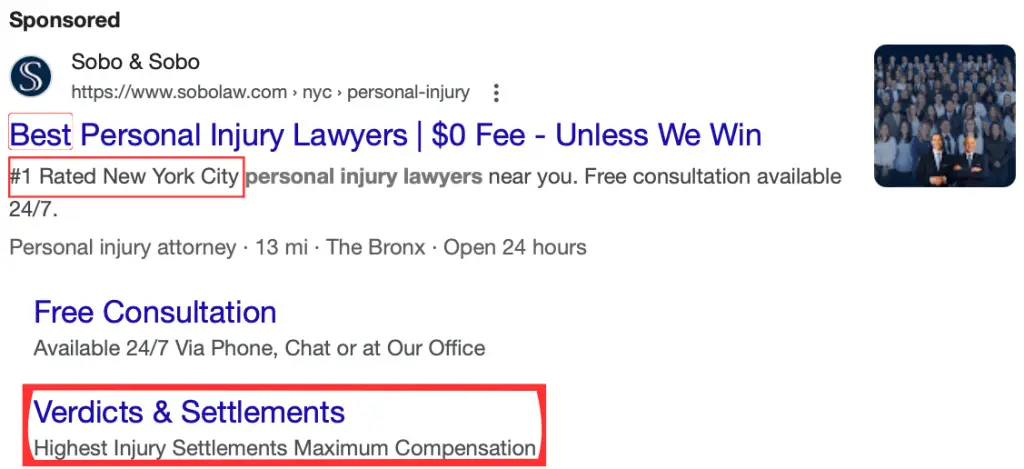
4) Messaging for Financially Qualified vs. Price-Sensitive Clients
High-Net-Worth & Premium Clients
Key Concerns: Quality of legal representation, expertise, personalized service
Best Messaging Approach:
Luxury positioning: “Discreet & Strategic Legal Counsel for High-Asset Divorce”
Use exclusivity: “We Only Work with Serious Injury Cases – Maximum Settlements”
Showcase elite credentials: “Ivy League-Trained Business Lawyer for High-Stakes Litigation”
Budget-Conscious & Low-Cost Searchers
Key Concerns: Cost, affordability, payment plans
Best Messaging Approach:
Address affordability if relevant: “Flat-Fee Bankruptcy Services – No Hidden Costs”
Clarify flexible payment options: “We Offer Payment Plans for Criminal Defense Cases”
If not targeting budget clients, exclude price-based messaging and use negative keywords.
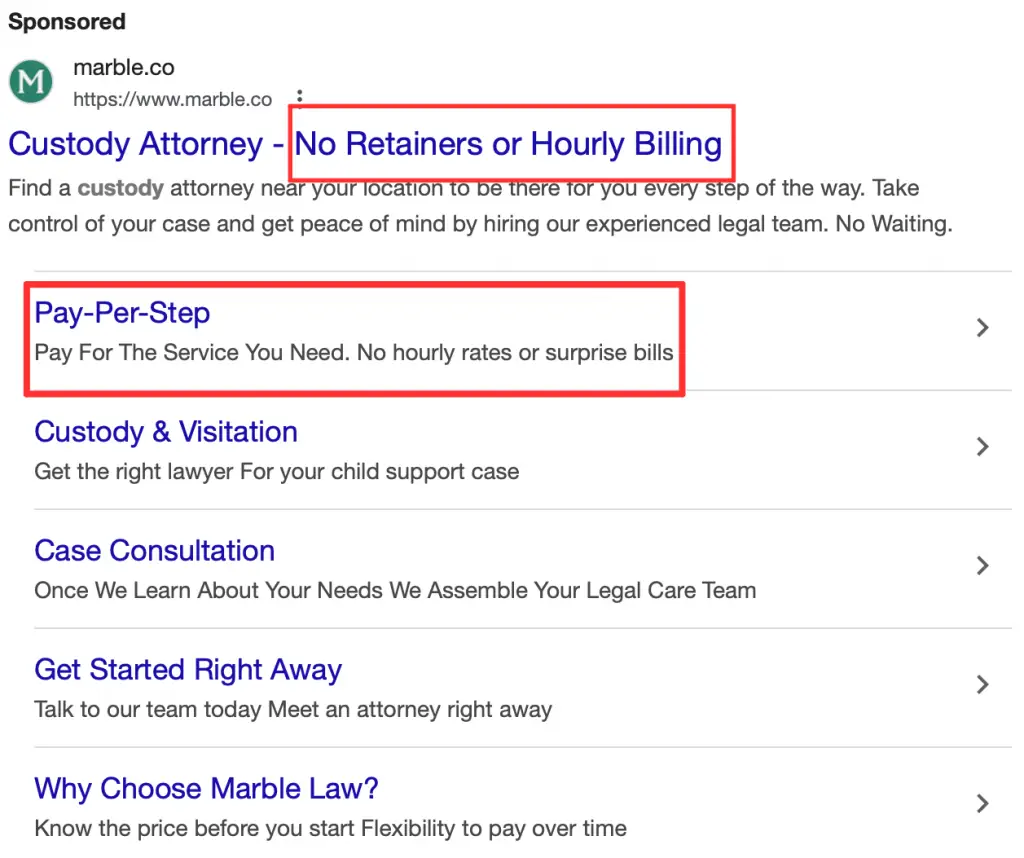
5) Messaging for Routine Legal Services vs. Complex Cases
Routine Legal Services (Quick Decision, Lower Cost)
Examples: Simple wills, uncontested divorce, traffic ticket defense
Best Messaging Approach:
Emphasize ease and efficiency: “Fast & Affordable Uncontested Divorce – File Today”
Use clear pricing (if applicable): “Estate Planning Packages Starting at $499”
Reassure simplicity: “No Court Appearances – We Handle Everything”
High-Stakes Legal Cases (Complex, High-Value)
Examples: Corporate litigation, medical malpractice, wrongful death lawsuits
Best Messaging Approach:
Emphasize experience and expertise: “Top Trial Attorney with 25+ Years in Complex Litigation”
Use case results: “$10M+ Secured for Malpractice Victims – See Our Case Wins”
Address credibility: “Board-Certified Specialist in High-Stakes Legal Matters”
Campaign Types: The Most Effective Google Ads Strategies for Law Firms
For law firms, choosing the right Google Ads campaign type is critical because every click costs significantly more than in other industries. With CPCs often exceeding $50–$100, an inefficient campaign structure can drain budgets without generating real clients.
The key to success is using only the most conversion-focused campaign types that directly align with how potential legal clients search for and select attorneys.
1) Search Ads: The Foundation of High-Intent Legal Leads
Search campaigns are the most profitable for law firms because they reach people actively searching for legal help. Since hiring a lawyer is a high-consideration decision, clients typically look for expertise, availability, and trust indicators before making contact.
Local Service Ads (LSAs) – The Best Choice for Lawyers
LSAs appear above regular search ads, providing immediate visibility for law firms.
Operate on a pay-per-lead basis rather than per click, reducing the risk of budget waste.
Feature Google Screened badges, increasing credibility and trust with potential clients.
Best Practices for Law Firms:
Get Google Screened ASAP – LSAs don’t run without verification.
Set clear service areas – Avoid receiving leads from regions you don’t serve.
Encourage satisfied clients to leave reviews – Google prioritizes law firms with higher ratings.
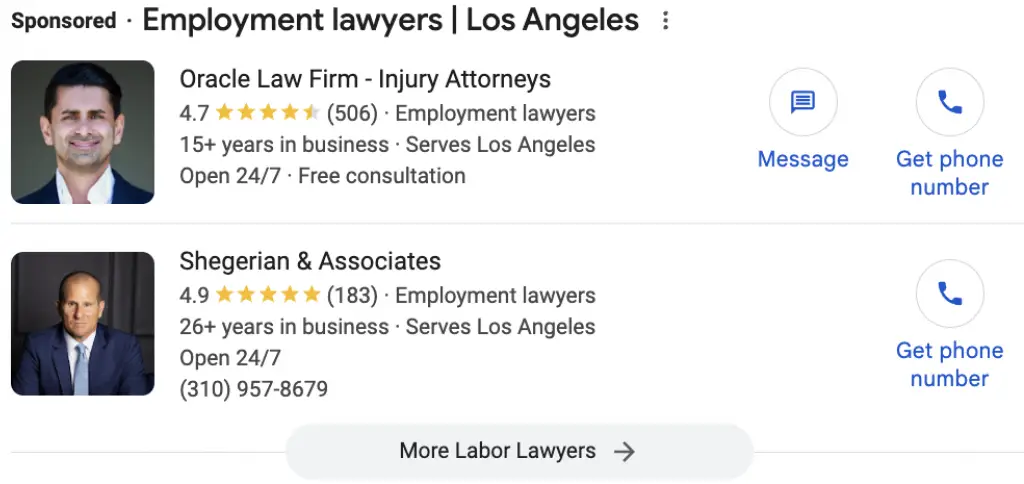
Search Ads: How Lawyers Should Structure Their Campaigns
Law firm campaigns should NEVER mix practice areas. Instead, structure by case type (e.g., Personal Injury, Criminal Defense, Family Law).
Ad groups should be as specific as possible. Example:
Personal Injury Lawyer → Car Accidents, Slip & Fall, Medical Malpractice.
Family Lawyer → Divorce, Child Custody, Alimony.
Criminal Defense → DUI, Drug Charges, Assault Defense.
Use exact and phrase match keywords to avoid paying for unqualified traffic.
Call Extensions & Location Extensions are essential—most legal leads come from direct calls.
2) Display Ads: Only Effective for Retargeting
Display ads have limited use for lawyers because they target passive users rather than people actively searching for legal help. However, they are valuable for retargeting users who have already engaged with your firm.
Best Use Case for Law Firms: Remarketing
Many potential clients visit a law firm’s site but don’t convert immediately.
Retargeting keeps your firm top of mind, encouraging them to come back when they’re ready to hire.
Best Practices:
Segment retargeting audiences by practice area (e.g., show different ads to a family law lead vs. a personal injury lead).
Exclude users who already submitted a form or called to avoid wasted ad spend.
Use persuasive messaging: “Injured in an accident? Don’t wait—get the compensation you deserve.”

3) Performance Max: Multi-Channel Lead Optimization
Performance Max campaigns use Google’s AI to distribute your ads across Search, Display, YouTube, and Gmail while optimizing for conversions.
This campaign type is useful for law firms with multiple practice areas that want to let Google auto-distribute budget to the highest-performing channels.
When to Use It:
If you handle both high-urgency (DUI, Personal Injury) and research-heavy (Estate Planning, Business Law) cases.
If you want maximum exposure without manually adjusting bids across channels.
Best Practices:
Upload high-quality video, image, and text assets to give Google flexibility in testing.
Monitor lead quality aggressively – PMax sometimes optimizes for low-value conversions if left unchecked.
Use audience signals based on people who engaged with your firm before.
4) Demand Gen: Attracting Legal Clients Before They Search
Demand Gen campaigns allow law firms to reach potential clients before they actively search for a lawyer by placing ads in Google Discover, YouTube, and Gmail.
When to Use It:
If you specialize in longer sales-cycle cases (e.g., Estate Planning, Business Contracts, Intellectual Property Law).
If you want to educate potential clients before they even know they need legal representation.
Best Practices:
Use client testimonials and case study videos.
Target users who recently searched for legal topics but haven’t engaged with a law firm yet.
Focus on high-quality visual content—static text ads perform poorly in this format.
5) YouTube Ads: Establishing Authority & Trust
Legal clients often need reassurance before choosing a lawyer. YouTube ads allow law firms to establish credibility through video content.
When to Use It:
If you have strong video content (e.g., case studies, client testimonials, or educational legal breakdowns).
If you want to retarget previous site visitors with video ads.
Best Practices:
Keep videos short and to the point (15-30 seconds for skippable ads, 6 seconds for bumper ads).
Use real client testimonials or lawyer introductions to build trust.
Target custom intent audiences based on legal searches (e.g., users who searched “best personal injury lawyer near me”).
These two videos effectively capture attention and maintain engagement while delivering a relevant message.
A classic yet high-quality video. We particularly appreciate the two short testimonials featured in it.
Content of the Ads: Crafting High-Converting Legal Ad Copy
For law firms, every word in an ad must be optimized for conversion. With some legal keywords costing $50–$100 per click, an ineffective ad leads to wasted budget, while highly optimized ad content turns searches into high-value cases.
The best legal ads combine compelling headlines, persuasive descriptions, strategic ad extensions, and impactful visual elements like images and videos to maximize engagement and lead generation.
1) Headlines: Grabbing Attention and Building Trust
Legal clients don’t browse—they search with urgency. Your headline must immediately communicate credibility, urgency, and clear benefits.
Best Practices for Law Firm Ad Headlines
Highlight Experience & Authority:
“25+ Years Winning Personal Injury Cases”
“Board-Certified Criminal Defense Lawyer”
Use Client Pain Points & Solutions:
“Arrested? Get a Top-Rated Defense Attorney Now”
“Injured? You May Be Entitled to Compensation”
Showcase Trust & Results:
“$100M+ Recovered for Clients”
“5-Star Rated Family Law Attorney”
Create Urgency & CTA:
“Free Consultation – Speak with a Lawyer Now”
“Time-Sensitive Case? Call 24/7 for Immediate Help”
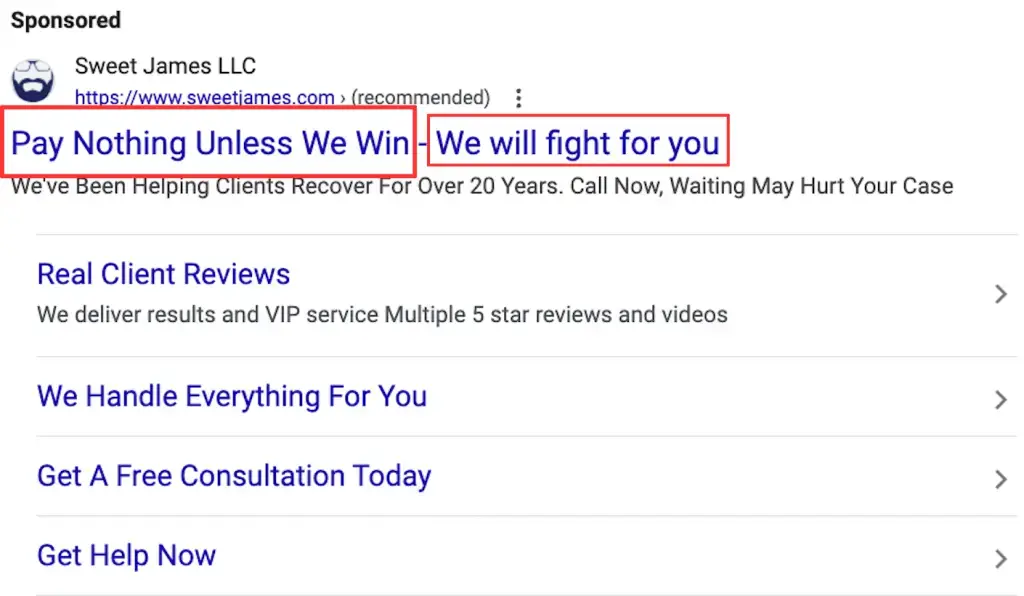
2) Descriptions: Turning Clicks into Cases
Once a user clicks, the description must immediately remove doubts and encourage action.
Best Practices for Law Firm Ad Descriptions
Establish Unique Value & Differentiation:
“Top-Rated DUI Lawyer – We Fight to Keep Your Record Clean”
“Aggressive Personal Injury Lawyers – No Fee Unless You Win”
Address Common Client Concerns:
“Medical Bills Piling Up? We Handle Insurance & Lawsuits for You.”
“Your Freedom Is at Stake – Let Our Criminal Defense Experts Fight for You.”
Incorporate a Strong Call-to-Action (CTA):
“Call Now for a Free Case Evaluation – Available 24/7”
“Don’t Wait – Protect Your Future with Experienced Legal Counsel”

3) The Role of Images & Videos in Legal Ads
While legal ads are primarily text-driven, images and videos add a layer of credibility and engagement, particularly in highly competitive markets.
Images in Legal Ads: What Works Best?
Attorney Headshots → Builds trust and familiarity.
Team Photos → Shows the firm’s credibility and size.
Client Success Images → E.g., handshake after a case win, reinforcing positive outcomes.
Office Photos → Establishes legitimacy, especially for high-net-worth legal clients.
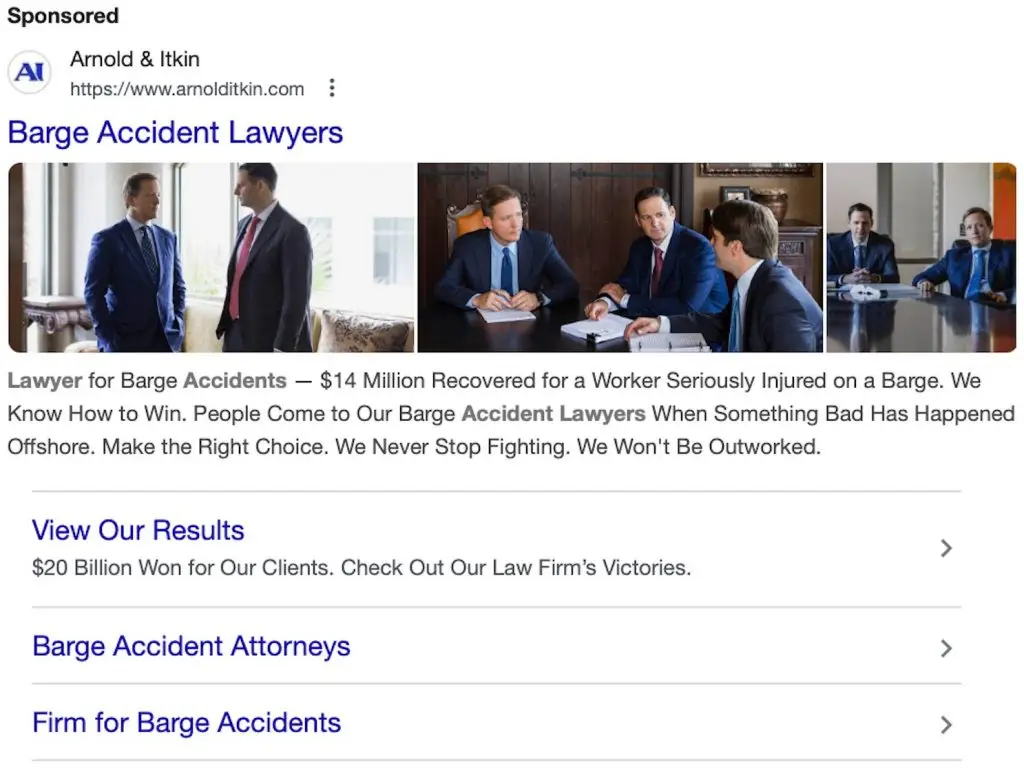
Video Ads: The Ultimate Trust-Building Tool
Video ads are a powerful way for lawyers to establish credibility and differentiate themselves in a crowded legal market.
Best Use Cases for Law Firms:
Client Testimonials → Real clients discussing their case results.
Lawyer Introductions → Short videos where attorneys explain their expertise and approach.
Legal Education Videos → Explaining common legal concerns (e.g., “What to Do After a Car Accident”).
Case Study Videos → Showcasing how the firm successfully won a major case.
Best Practices for Legal Video Ads:
Keep it short and direct (15-30 seconds for skippable ads, 6 seconds for bumper ads).
Use captions—many users watch without sound.
End with a strong CTA: “Call Now for a Free Consultation.”
4) Ad Extensions: Maximizing Visibility and Engagement
Google Ads rewards law firms that provide more relevant information. The right ad extensions improve visibility, credibility, and conversion rates.
a. Sitelink Extensions: Direct Clients to the Right Pages
Best for Law Firms:
“Free Consultation” → Links to the contact form
“Case Results” → Links to past verdicts/settlements
“Meet Our Attorneys” → Links to lawyer bios
“Client Testimonials” → Links to real client reviews
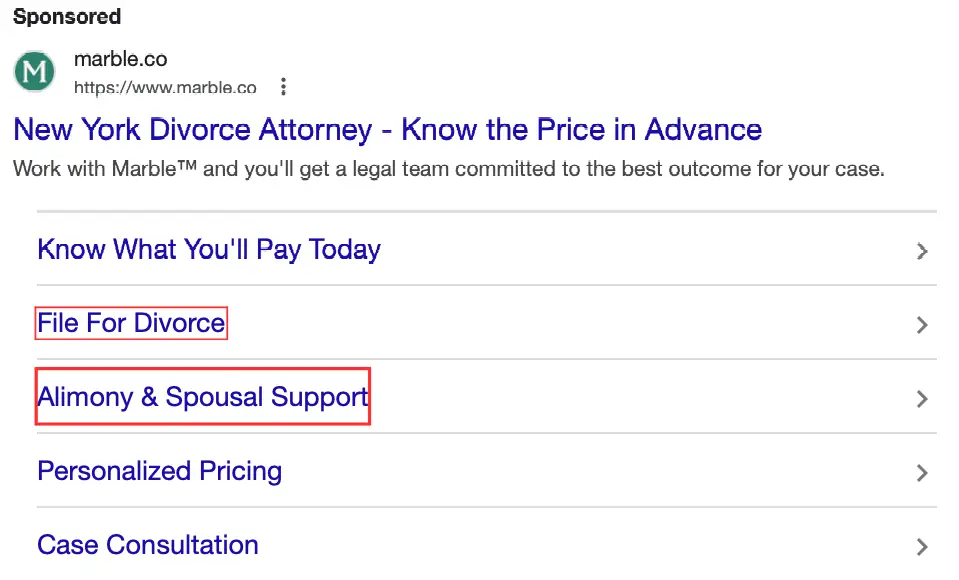
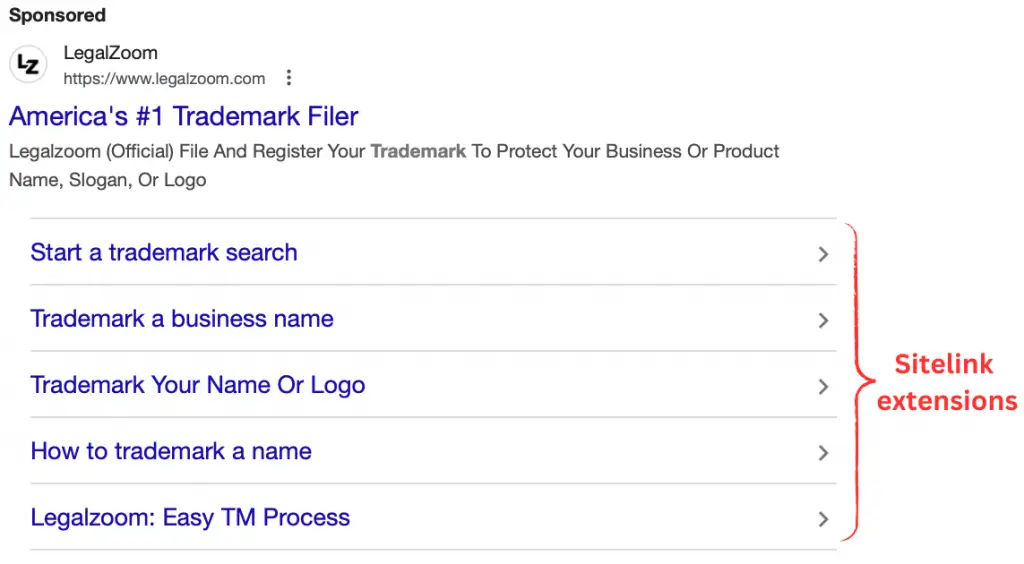
b. Callout Extensions: Reinforce Key Selling Points
Best for Law Firms:
“No Fee Unless You Win”
“Available 24/7 – Call Anytime”
“Over $50M Recovered for Clients”
“Se Habla Español”
c. Structured Snippets: Showcasing Legal Specialties
Best for Law Firms:
“Practice Areas: Personal Injury, Car Accidents, Medical Malpractice, Slip & Fall”
“Legal Services: Divorce, Child Custody, Spousal Support, Prenups”
“Case Types: DUI, Drug Crimes, White Collar Defense, Violent Crimes”
d. Location Extensions: Building Local Trust
Essential for Law Firms as legal clients prefer local representation.
Displays your law firm’s office address directly in the ad.
Boosts local credibility and trust by showing proximity.
Best for Urgent Legal Services: DUI, personal injury, and criminal defense
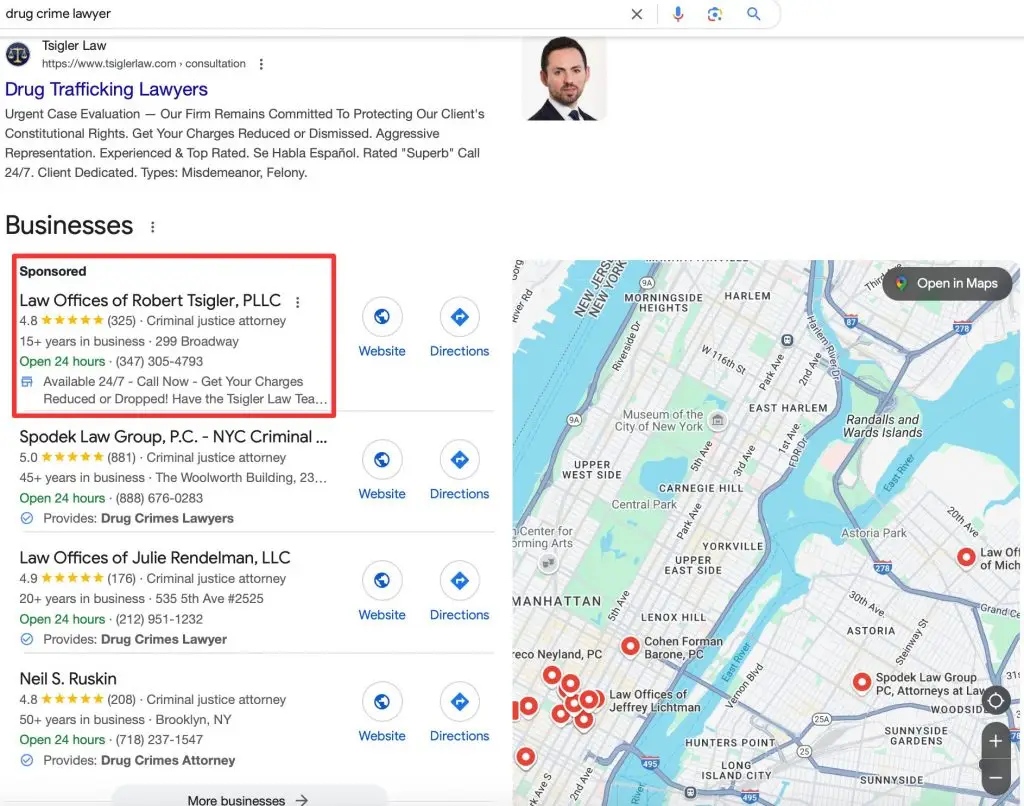
Make sure your Location extension is enabled in your Google Ads account to maximize your chances of securing that valuable space
We notice that this law firm occupies the two most valuable spots on the search results page with its Search Ad and Google Maps Ad
e. Price Extensions: Transparency for Fixed-Fee Services
Useful for Law Firms Offering Flat Fees:
“Uncontested Divorce – $499 Flat Fee”
“DUI Defense – Payment Plans Available”
“Estate Planning Packages from $1,000”
f. Lead Form Extensions: Direct Lead Capture Without a Website Click
Best for High-Urgency Clients:
“Arrested? Submit Your Case Details & Get a Lawyer Callback.”
“Injured in an Accident? Claim Evaluation in 60 Seconds.”
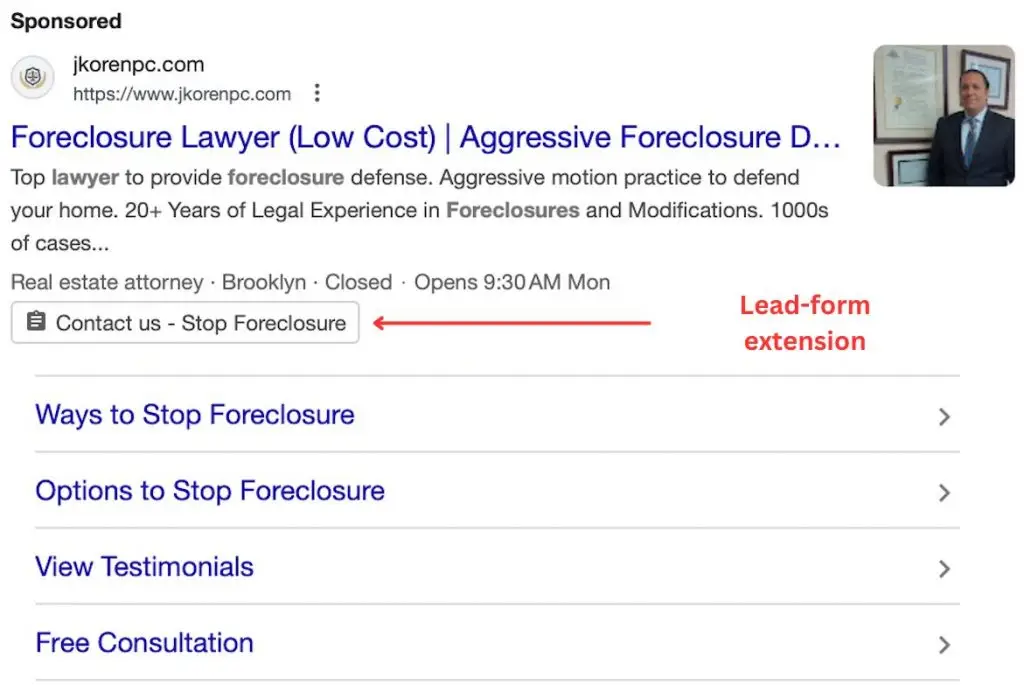
g. Call Extensions: The Most Important Extension for Law Firms
Legal clients prefer calling over filling out forms.
Best Practices:
Enable “Call During Business Hours” for direct intake team connection.
For 24/7 practices, ensure calls route to an after-hours team.
h. Promotion Extensions: Encouraging Immediate Action
Best for Law Firms Running Limited-Time Offers:
“Limited-Time Free Consultation – Book Now”
“Discounted Estate Planning for New Clients This Month”
“Special Offer: No Fee Unless You Win”
i. Review Extensions: Leveraging Social Proof for Higher Conversions
Review extensions help law firms establish credibility by displaying positive third-party reviews directly in their ads.
Given that legal services rely heavily on trust and reputation, these extensions can significantly improve click-through and conversion rates.
- Best Practices:
- Use verified third-party sources (e.g., Google Reviews, Trustpilot, Avvo, Martindale-Hubbell) since review extensions require Google-approved sources.
- Maintain a strong overall rating—Google typically only displays ratings of 3.5 stars or higher.
- Ensure your reviews are recent, as outdated reviews may not be eligible to appear.
- Keep reviews relevant to your practice area, as Google prioritizes reviews that match the advertised legal service.
- Meet Google’s minimum review requirement, which varies by region but typically requires a certain number of reviews before they can be displayed.
By meeting these criteria, law firms can increase their chances of displaying review extensions, strengthening credibility and improving conversion rates for potential clients seeking legal representation.
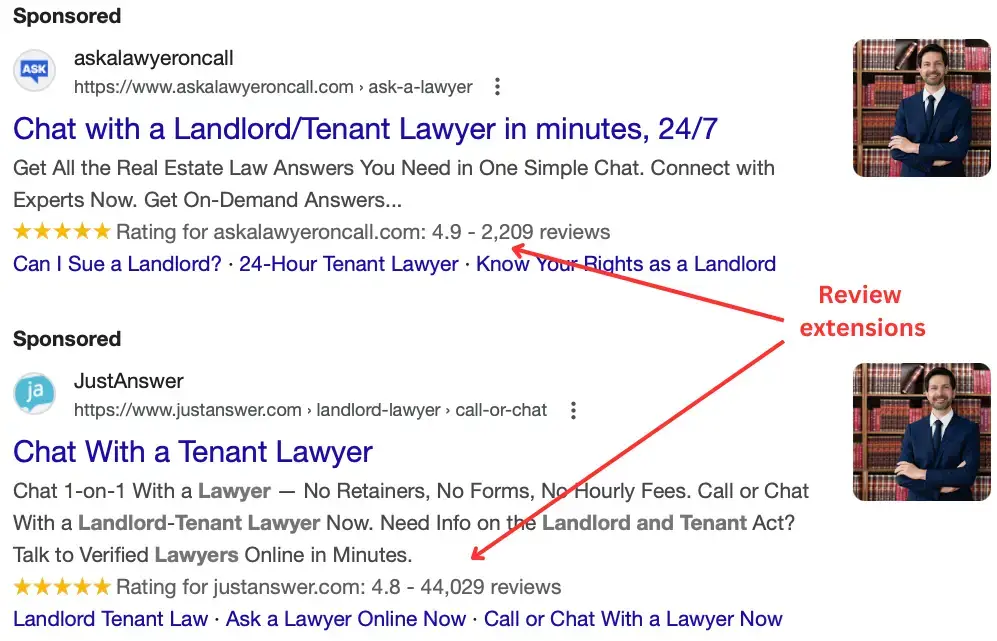
Landing Page: How to Convert More Legal Clients
A high-converting landing page is just as important as the ad itself. Many law firms waste thousands of dollars in Google Ads spend because their landing pages are too generic, lack trust elements, or fail to drive immediate action.
Unlike eCommerce or service businesses, legal clients don’t browse—they act out of necessity. A well-optimized legal landing page must build credibility instantly, eliminate hesitation, and drive immediate consultations.
Here’s exactly how to structure a lawyer-specific landing page that maximizes conversions.
1) The Core Structure of a High-Converting Lawyer Landing Page
A legal landing page must be structured to eliminate distractions and push the user toward taking action. The ideal format is:
1.1 Above-the-Fold Content: Immediate Trust & Call-to-Action
Headline That Addresses the Client’s Pain Point:
Personal Injury: “Injured? Get Maximum Compensation – No Win, No Fee.”
Criminal Defense: “Arrested? Call a Top Defense Lawyer 24/7.”
Family Law: “Facing Divorce? Protect Your Assets & Custody Rights.”
Subheadline Reinforcing Expertise:
“Top-Rated Personal Injury Attorneys – Over $100M Won for Clients.”
“Former Prosecutor Now Fighting for Your Defense.”
Strong Call-to-Action (CTA) Button:
“Call Now for a Free Case Review.”
“Schedule Your Consultation Today.”
“Get Legal Help – Submit Your Case Now.”
Click-to-Call Phone Number Displayed Prominently:
Must be clickable on mobile and always visible.
Trust Signals (Social Proof & Authority Badges):
Showcase affiliations & awards: Avvo Ratings, Martindale-Hubbell, Super Lawyers.
Google Reviews & Client Testimonials: Embed ratings from Google, Trustpilot, or Yelp.
1.2 Social Proof: Case Results & Client Testimonials
Real Client Testimonials (Video Works Best):
If possible, use video testimonials of real clients explaining how the firm helped them.
“I was in a serious accident, and [Law Firm] got me a $500,000 settlement.”
Case Results to Prove Success (If Allowed in Your Jurisdiction):
“$3.2M Recovered – Truck Accident Injury”
“95% Case Success Rate in Criminal Defense”
“Over 1,000 Families Helped Through Divorce”
Google & Avvo Ratings Displayed Prominently:
“500+ 5-Star Reviews on Google – See Why Clients Trust Us!”
1.3 Lead Form Section: Simple, Fast, and Focused
Only Ask for Essential Information:
Name, phone number, email, case type (drop-down menu), and a message field.
Use Conversion-Optimized Copy Around the Form:
“100% Confidential. No Obligation. Free Case Review.”
“Submit Your Case in 30 Seconds – Get a Lawyer Response Now.”
Auto-Submit on Enter Key for Faster Conversions.
1.4 Unique Selling Proposition (USP): Why Choose This Firm?
Law is a highly competitive space—explain why your firm is the best choice.
“No Win, No Fee Guarantee – We Cover All Costs Until You Win.”
“Available 24/7 – Immediate Legal Help When You Need It Most.”
“Former Prosecutor Now Defending Your Rights – We Know Both Sides.”
1.5 Urgency & Scarcity Elements to Push Action
Time-Sensitive Messaging for Injury & Criminal Cases:
“Deadlines Apply for Filing Your Case – Don’t Miss Your Chance.”
“Limited Slots for Free Consultations – Call Now.”
Countdown Timer for Limited-Time Consultations (If Relevant).
2) Critical Landing Page Features That Increase Law Firm Conversions
2.1 Mobile-First Design & Lightning-Fast Load Time
Over 70% of legal searches happen on mobile.
Ensure fast loading (under 3 seconds) or risk losing clients to competitors.
Click-to-call buttons must be large, obvious, and easy to tap.
2.2 Live Chat or AI Chatbots to Capture Leads
Many clients hesitate to call immediately but will chat online.
Best for firms handling high-volume inquiries (e.g., personal injury, DUI).
AI-powered chatbots can pre-qualify leads before a lawyer speaks with them.
2.3 Security & Confidentiality Disclaimers to Build Trust
Lawyer-client privilege matters—make sure visitors feel safe.
Display “Your information is 100% confidential & secure.”
Use SSL certification and privacy disclaimers.
3) What Lawyers Should AVOID on Their Landing Pages
Navigation Links or Menus:
A landing page should have one purpose—converting users. Links to “About Us” or “Blog” create distractions.
Too Much Legal Jargon:
Clients are not lawyers. Keep the language simple and results-focused.
Stock Photos of Gavels & Courthouses:
Real lawyer images significantly outperform stock legal imagery.
Massive Walls of Text:
Nobody wants to read an essay—keep paragraphs short and actionable.
4) A/B Testing: How to Optimize Your Law Firm’s Landing Page Over Time
Even with the right setup, constant testing is key to maximizing conversions.
Test Different Headlines:
“Top Personal Injury Lawyers” vs. “Injured? Get Compensation Now”
Test CTA Buttons:
“Call Now for a Free Case Review” vs. “Get Legal Help Today”
Test Form Placement:
Right side of the page vs. Centered under the main heading
Test Different Images & Videos:
Attorney video introduction vs. Written testimonials
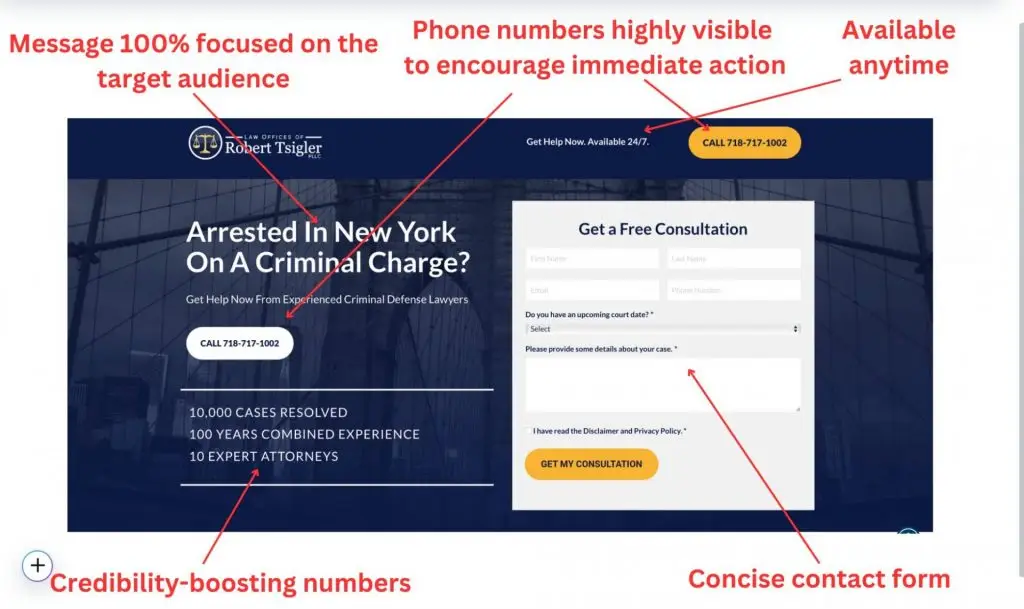
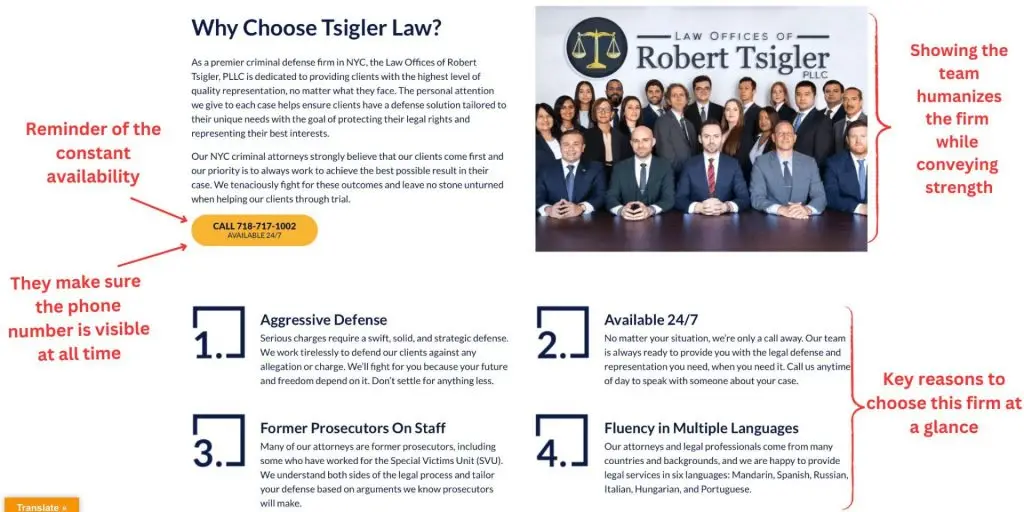
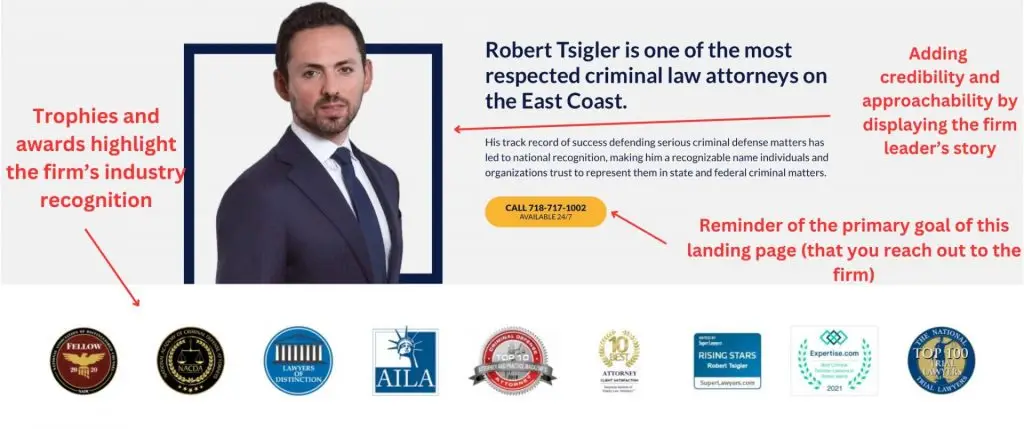

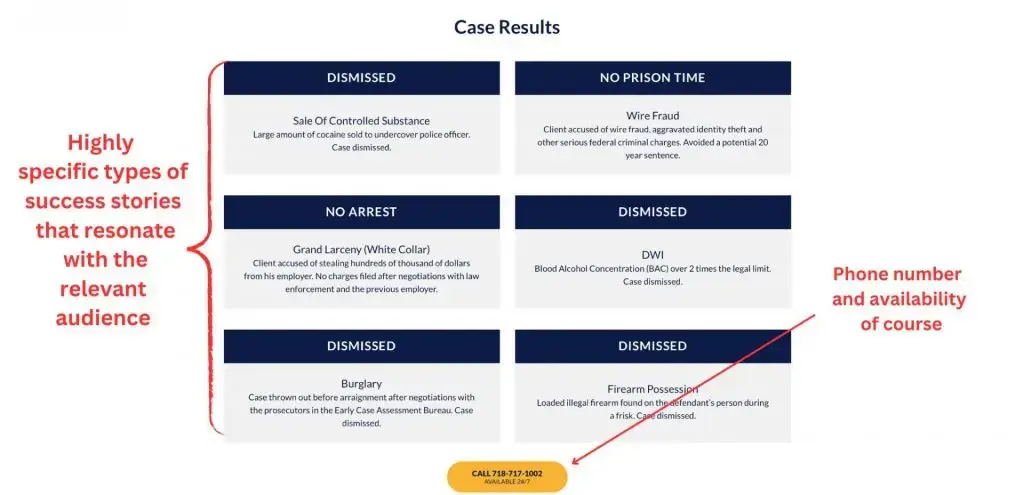
Success Stories: How Law Firms Are Winning with Google Ads
Law firms that use Google Ads the right way are seeing massive returns on investment, turning paid traffic into high-value cases and consistent client acquisition.
Here are three real-world success stories of attorneys who leveraged Google Ads to grow their firms, beat their competition, and sign better cases.
1) Personal Injury Law Firm: Turning Google Ads Into a 7-Figure Case Pipeline
The Challenge:
A personal injury law firm in Los Angeles had built a solid reputation over the years but struggled with inconsistent lead flow.
They relied heavily on referrals and organic search, but competitors with aggressive marketing budgets were dominating high-intent searches like “car accident lawyer near me.”
The firm needed a way to compete effectively in Google Ads without wasting money on unqualified leads.
The Google Ads Strategy:
Shifted budget from traditional Search Ads to Local Service Ads (LSAs), which prioritize law firms at the top of Google results.
Optimized their Google Screened profile by increasing client reviews and uploading professional team photos.
Bid aggressively on high-value terms like “best personal injury lawyer in LA,” avoiding broad terms that attract low-quality leads.
Used geo-targeting to exclude areas where the firm wasn’t interested in taking cases.
The Results:
500% increase in qualified leads within 90 days.
Reduced cost per lead by 43%, making the campaign more cost-effective.
Signed multiple seven-figure settlement cases, including a $2.8M trucking accident case and a $1.5M slip-and-fall settlement.
LSAs delivered higher-quality leads—80% of LSA leads converted into actual client consultations.
2) Criminal Defense Attorney: Outperforming Larger Firms with a Smart Competitor Strategy
The Challenge:
A solo criminal defense attorney in Miami was losing cases to larger, more established firms that dominated both organic search and paid ads.
Despite having excellent Google reviews and a strong case success rate, potential clients weren’t finding his firm when they searched for “DUI lawyer Miami” or “criminal defense attorney near me.”
The Google Ads Strategy:
Launched a Competitor Name Campaign, bidding on search terms that included the names of well-known competing law firms.
Crafted persuasive ad copy emphasizing why clients should choose his firm over the competition:
“Facing DUI Charges? Don’t Settle for [Competitor Name]. Get Aggressive Defense.”
“Charged with a Crime? We Have a 98% Case Success Rate. Call Now.”
Added Call-Only Ads to encourage direct consultations instead of relying on website form fills.
Deployed remarketing Display Ads targeting people who had previously visited the firm’s website but didn’t convert.
The Results:
33% of new leads came from competitor-branded search terms.
The firm cut its cost per acquisition (CPA) by 28%, as these leads were already searching for legal help.
Doubled signed cases within six months, allowing the firm to expand and hire two additional attorneys.
3) Divorce & Family Law Firm: Tripling Conversions with Call Extensions & Live Chat
The Challenge:
A divorce law firm in Chicago had been running Google Ads for months but wasn’t seeing a strong return on investment. Many people clicked their ads but never submitted consultation requests.
The firm realized that potential clients were hesitant to commit immediately and needed an easier way to ask questions before making a decision.
The Google Ads Strategy:
Added Call Extensions & Lead Form Extensions, making it easy for potential clients to contact the firm directly from the ad.
Adjusted ad copy to speak to the emotional concerns of someone going through a divorce:
“Protect Your Assets & Custody Rights – Speak with a Lawyer Now.”
“Divorce Doesn’t Have to Be Messy – Get Legal Help Today.”
Introduced a Live Chat Widget on the Landing Page, allowing users to ask basic legal questions before scheduling a consultation.
Set up Display Remarketing Ads, targeting visitors who had engaged with the website but didn’t book a consultation.
The Results:
Tripled conversion rates after implementing Call Extensions and Lead Form Extensions.
20% of leads came from Live Chat, proving many clients prefer a direct conversation before committing to a lawyer.
Attracted more high-net-worth divorce cases, increasing average case value significantly.
The Real Cost of Google Ads for Lawyers in 2025
Google Ads for law firms is one of the most competitive and expensive digital marketing channels, with cost-per-click (CPC) often exceeding $100–$200 for the most sought-after legal keywords.
If a law firm is not careful, it can easily waste tens of thousands of dollars on ineffective ads that don’t bring in high-value clients.
Understanding what drives costs, how to set a realistic budget, and how to maximize ROI is critical for making Google Ads a profitable investment.
1) What Determines the Cost of Google Ads for Law Firms?
The cost of Google Ads varies by legal practice area, geographic location, and competition. Here’s what drives CPC up or down for lawyers:
Practice Area Dictates CPC Pricing
Personal Injury: $100–$200 per click – Highest CPC due to contingency fee potential ($50,000+ case value)
Criminal Defense: $50–$150 per click – Clients in urgent need, making competition fierce
DUI Defense: $75–$140 per click – High urgency, but high competition
Divorce & Family Law: $25–$75 per click – Highly emotional decisions, longer sales cycle
Estate Planning: $10–$50 per click – Lower CPC, but high-value lifetime clients
Business Law: $20–$70 per click – Steady demand, but often lower conversion rates
Employment Law: $20–$80 per click – Competitive for wrongful termination and discrimination cases
Immigration Law: $10–$50 per click – Consistent demand, lower competition than other fields
Location Greatly Impacts Cost
Major metro areas (Los Angeles, NYC, Chicago, Miami, Houston): Highest CPC due to saturation of law firms bidding on the same terms.
Mid-sized cities: Slightly lower CPC but still competitive.
Smaller cities & rural areas: CPC may be 50% lower, but search volume is also smaller.
Law Firm Reputation & Google Ads Quality Score
Firms with better reviews (4.5+ stars) pay lower CPCs because their Google Local Service Ads (LSAs) rank higher.
Landing page experience matters—slow or poorly optimized pages result in higher CPCs.
Ad relevance impacts cost—using exact-match legal terms lowers CPC by increasing the ad’s Quality Score.
2) How Much Should a Law Firm Budget for Google Ads?
The monthly budget for Google Ads should be based on the practice area, location, and revenue goals. A lawyer advertising in a large metro area will spend more than a small-town attorney. Here’s a realistic budget breakdown:
Recommended Google Ads Budgets for Law Firms
Small-town solo firm: $2,500–$5,000/month (Lower CPC, fewer searches)
Mid-sized firm in competitive market: $7,000–$20,000/month
Large firm in major metro area: $30,000–$100,000+/month (High CPC, but higher case value)
How to Calculate Your Law Firm’s Ideal Google Ads Budget
Determine Target Case Value:
If a personal injury case is worth $100,000+, spending $5,000+ per month on ads makes sense.
If an estate planning client is worth $3,000, the firm needs lower CPCs and higher conversion rates to stay profitable.
Estimate Cost Per Case Acquisition (CPA):
If CPC is $100 and 10% of clicks turn into a lead, cost per lead = $1,000.
If 20% of leads become paying clients, cost per client = $5,000.
Ensure a Profitable Return on Investment:
If acquiring a $100,000 case costs $5,000 in ad spend, that’s a 20:1 ROI—highly profitable.
If acquiring a $3,000 estate planning client costs $1,500, the margin is much lower, requiring efficiency.
3) Is Google Ads Worth It for Lawyers in 2025?
✅ Yes—If You Have the Right Strategy.
Google Ads is a goldmine for law firms that:
Target high-value case types instead of generic keywords.
Utilize LSAs for direct pay-per-lead efficiency.
Optimize their landing pages for conversion.
Have a strong intake system to turn leads into paying clients.
❌ No—If You Run a Poorly Optimized Campaign.
Many law firms waste thousands on poorly structured Google Ads. If your firm doesn’t actively optimize campaigns, you’ll:
Pay too much per click and get low-quality leads.
Lose potential clients because your landing page isn’t optimized.
See competitors outbid and outperform you due to better Google Ads strategy.
Compliance and Ethics for Lawyers Advertising on Google Ads
Law firms using Google Ads must navigate strict advertising regulations to avoid ethical violations and potential disciplinary action.
Unlike other businesses, lawyers are bound by state bar rules, ABA guidelines, and Google’s advertising policies. Failing to comply can result in ad disapproval, fines, or even bar sanctions.
1) Avoid False or Misleading Claims
Do not guarantee case results (e.g., “We Win 99% of Cases” is unethical in many jurisdictions).
Be careful with superlatives like “Best Lawyer” unless backed by verifiable awards.
Clearly distinguish testimonials from actual case outcomes.
2) Ensure Proper Disclaimers
If listing case results, add a disclaimer: “Past results do not guarantee future outcomes.”
State whether free consultations apply to all cases or only specific ones.
3) Respect State Bar Rules on Client Solicitation
Some states prohibit real-time solicitation—avoid aggressive call-to-action language like “Act Now Before It’s Too Late.”
Google Local Service Ads (LSAs) require verification—ensure compliance before running ads.
4) Use Ethical Retargeting and Data Collection
Do not expose sensitive legal topics in retargeting ads (e.g., “Charged with a Crime? Hire a Lawyer Today” can violate privacy laws).
Ensure landing pages include confidentiality notices if collecting client info.
5) Avoid Unauthorized Practice of Law (UPL) Issues
If advertising across state lines, clearly state your licensed jurisdictions.
No misleading geographic targeting—don’t bid on a city where you’re not licensed unless disclaiming availability.
Synergy Between Google Ads and Facebook Ads for Law Firms
Law firms that combine Google Ads and Facebook Ads see better client acquisition, brand positioning, and lead conversion.
Google Ads captures high-intent legal prospects actively searching for a lawyer, while Facebook Ads reinforces credibility, nurtures undecided clients, and retargets potential leads who didn’t convert immediately.
This two-step approach ensures law firms maximize both immediate case sign-ups and long-term brand awareness.
1) How Google Ads and Facebook Ads Complement Each Other in Legal Marketing
Google Ads: Best for capturing high-intent leads from users searching for urgent legal help (e.g., “DUI lawyer near me,” “divorce attorney free consultation”).
Facebook Ads: Best for nurturing potential clients who need more time before hiring a lawyer, including retargeting website visitors and reinforcing authority through client testimonials, legal education, and brand awareness campaigns.
2) The Best Law Firm Strategy: Google Ads for Immediate Cases, Facebook Ads for Retargeting
Use Google Ads to target urgent legal needs (e.g., criminal defense, personal injury, family law consultations).
Retarget Google Ads traffic on Facebook to keep your law firm top-of-mind for potential clients who didn’t book a consultation immediately.
Show Facebook Ads only to users who visited your site but didn’t convert, reminding them why your firm is the right choice.
3) Best Facebook Retargeting Campaigns for Law Firms
Client Testimonial & Case Result Ads: Showcase real legal victories and client experiences to build trust (e.g., “John received $1.5M after his accident. See how we fought for him.”)
Legal Education Ads: Short explainer videos on common legal issues (e.g., “What to do after a car accident” or “Your rights in a divorce settlement”).
Urgency-Based Ads: Remind users of legal deadlines (e.g., “Statute of limitations for personal injury claims expires soon – don’t wait to file your case!”).
Live Chat or Lead Form Ads: Reduce friction for hesitant clients by letting them submit case details instantly through Facebook Messenger or a built-in lead form.
4) Using Facebook Data to Lower Google Ads Costs for Law Firms
Use Facebook Lookalike Audiences to find potential clients who behave similarly to those who hired you through Google Ads.
Exclude converted clients from Google Ads to prevent wasting budget on people who already signed up.
Leverage Facebook engagement data to refine Google Ads keywords (e.g., if a video on “child custody rights” gets strong engagement, test related keywords in Google Ads campaigns for family law cases).
5) Example: How a Family Law Firm Increased Leads by 40% with Google & Facebook Ads
The Problem:
A family law firm specializing in divorce, child custody, and spousal support was spending $10,000/month on Google Ads but struggled with low consultation bookings. Many leads clicked the ads but didn’t submit their details.
The Strategy:
The firm ran Google Ads targeting high-intent searches like “divorce lawyer near me” and “child custody attorney free consultation.”
Facebook retargeting ads were shown to Google Ads visitors who didn’t convert, featuring:
Client testimonial videos reinforcing success stories.
Urgency-driven messaging reminding clients about court deadlines.
Live chat ads that allowed users to ask questions before booking a consultation.
The Results:
40% increase in leads within 60 days.
Reduced Google Ads cost per acquisition by 25%, as Facebook retargeting improved conversion rates.
Higher-quality leads, as Facebook Ads built familiarity with prospects before they reached out.
Final Thought: Google Ads + Facebook Ads = More Cases & Lower Costs for Lawyers
Law firms that combine Google Ads for direct lead generation and Facebook Ads for retargeting, authority-building, and trust reinforcement consistently outperform firms that rely on just one platform.
Running both platforms together ensures your firm captures immediate legal clients while staying top-of-mind for those still deciding—leading to higher conversion rates, lower client acquisition costs, and more signed cases.
Even though all four Facebook Ads have their own strengths, if we had to pick one, it would be the last one—the ad telling Attorney Clell Warriner’s story.
Here’s why:
1.”$2 Million” appears right at the beginning. Numbers are always effective in grabbing attention.
2.The story includes specific details like “rear-ended by a dump truck” and “just a month before trial,” making it more compelling and believable.
